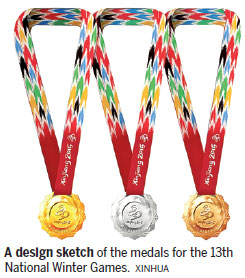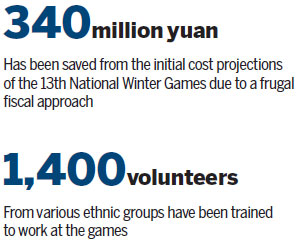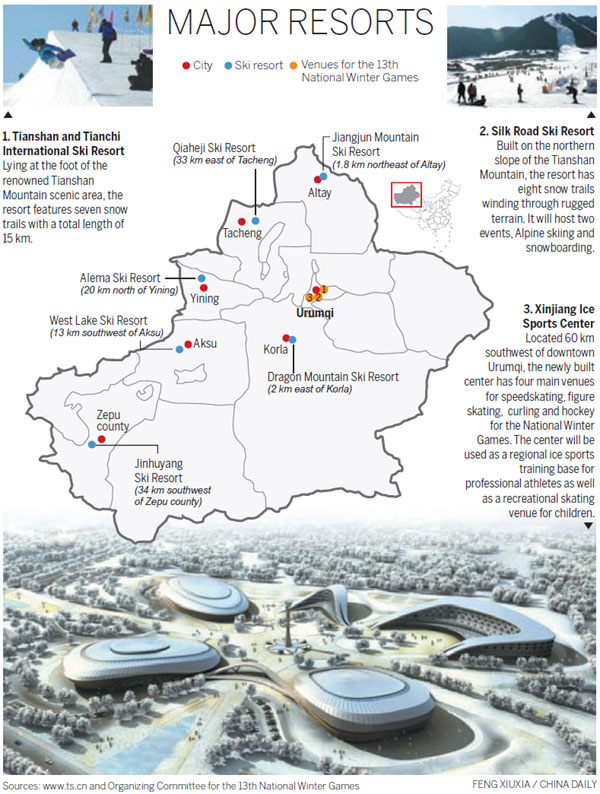
Later this month, the Xinjiang Uygur autonomous region will host China's largest winter sports event, in a move designed to boost the popularity of skiing and ice skating across the country in preparation for the 2022 Beijing Winter Olympics, as Sun Xiaochen reports.
Boasting ideal natural conditions and a welter of preparations, the Xinjiang Uygur autonomous region is gearing up to host the 13th National Winter Games, and help to promote winter sports across the country.
Once an obscure spot on China's sporting map, Xinjiang has risen rapidly as a destination for winter sports competitions and related activities. That rise was reflected when Urumqi, the regional capital, was chosen as the venue for the National Winter Games, which will run from Jan 20 to 30.
|
People from the Mongolian and Kazak ethnic groups play a traditional hunting game to welcome the new year on Jan 1 in the snowfields of the Kanas Lake scenic area in Altay, the Xinjiang Uygur autonomous region. Zhao Ge / Xinhua |
|
Players compete in a curling match during preparations for the 13th National Winter Games at the Xinjiang Ice Sports Center in Urumqi. Jiang Wenyao / Xinhua |
It will be the first time since the winter sports gala was introduced in 1959 that it will have been held outside the northeastern provinces of Heilongjiang and Jilin, where the frigid climate means winter sports have traditionally enjoyed huge popularity.
The Xinjiang event will see 54 provincial and municipal teams compete for 97 gold medals in 11 multi-disciplinary sports, including alpine skiing, speed skating and hockey over a 12-day period.
Despite never having staged a national-scale sporting event before, Xinjiang's potential as a host was obvious. Its advantages lay in favorable natural conditions, highlighted by abundant snowfall in moderately cold temperatures, a long tradition of sports that's deeply embedded in local culture, the rugged terrain and the full support of the local government.
The regional authorities have attached great importance to the preparatory work and are confident of successfully hosting the event, and promoting the image of the remote region at the same time, according to Zhang Chunxian, the Party chief of Xinjiang.
"The games provide a window for better understanding of Xinjiang's ethnic traditions, natural landscape and modern social development. We should seize the opportunity to promote the region while demonstrating the growing participation in winter sports here," Zhang said.

Funded by the government, a new, world-class ice sports center in a southwestern suburb of Urumqi will be the venue for all the ice-related action, including speed and figure skating, curling and hockey, while snow-based events will be staged at two existing resorts on the outskirts of the city that have been fully refurbished for the event.
A frugal approach
A frugal fiscal approach and a trimmed operational budget resulted in a saving of 340 million yuan ($52 million) from the initial cost projections, said Li Guangming, deputy secretary-general of the organizing committee, who didn't reveal the initial cost estimate.
Measures to cut expenditure included staging curling events at an ancillary rink at the figure skating venue rather than building a new center, and moving the opening ceremony from a giant outdoor stadium, which requires costly refurbishment, to a smaller speed skating oval.
"Under plans drafted for post-event operations, the new ice sports center will be transformed into a fixed training base for national and regional teams and an extracurricular winter sports center for local students," Li said.
All the proposed venues and teams of staff members have participated in warmup events, including the national curling championships and a national alpine skiing tournament last year. A multi-ethnic team of 1,400 volunteers has been trained to work at the games.
Urumqi has also announced a series of measures to involve local residents in the games, such as the local government and ski resorts donating 50,000 free tickets to communities and providing free parking lots at major venues, such as the Silk Road Ski Resort.
Awarding Xinjiang the rights to host the quadrennial sporting gala echoed the country's ambition to encourage 300 million people in North China to participate in winter sports and recreations while preparing for the 2022 Beijing Winter Olympic Games, said Liu Peng, China's sports minister.

"Encouraging more people to participate in winter sports outside the traditional northeastern provinces will highlight Beijing's successful bid for the 2022 Winter Olympics. Bringing this national event to the northwestern part of the country is a sound move toward implementing the plan," Liu said.
In July, Beijing and co-host Zhangjiakou, a city in Hebei province, were awarded the rights to host the 2022 Winter Games. The announcement echoed a growing nationwide passion for skating and skiing.
Participant numbers surge
Ski resorts have been benefiting from the surge in participant numbers, and not just in areas close to the Chinese capital but also in remote regions such as Xinjiang, where skiing has long been a crucial part of nomadic life.
In 2014, the Silk Road Ski Resort, in a southern suburb of Urumqi, turned its first profit in 11 years as annual visitor numbers rose by 87 percent, according to Li Jianhong, the managing director.
"Thanks to the promotion of winter sports by the successful Olympics bid and the National Winter Games, I believe the future of my business will be prosperous," he said.
In 2006, archaeologists in Altay, an ethnic prefecture in northern Xinjiang, discovered rock paintings of "skiers" from the late Paleolithic era, around 12,000 years ago. The paintings, depicting hunters skiing on long rectangular boards with poles in their hands, are cited as evidence that Altay was probably the birthplace of skiing in China.
"From a traditional way of life to a modern sporting fashion, winter sports are seeing a new dawn in Xinjiang," Li said.
Contact the writer at [email protected]
